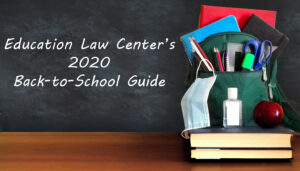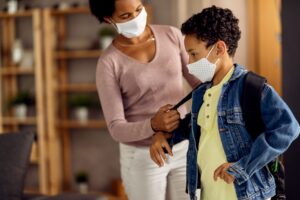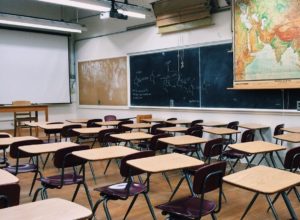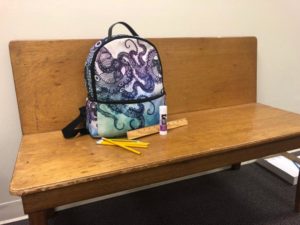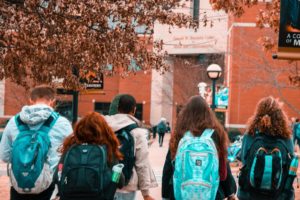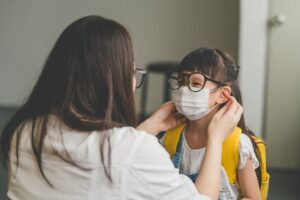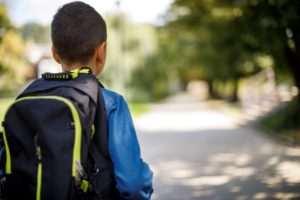As civil rights, youth, and education advocacy organizations across Pennsylvania, we oppose HB 1532 and all similar efforts that perpetuate racism and sexism. Our schools bear a responsibility to teach our children accurate history and dismantle biases. The bill prohibits our teachers from accurately teaching history, improperly bans anti-bias training, and would make culturally relevant teaching nearly impossible. The nearly 50 organizations from across Pennsylvania who have signed this letter oppose HB 1532. We urge the legislature to reject this harmful bill.
Author: elcadmin
Show Your Support For Senate Bill 324: “Fostering a Smooth Transition for Graduation”
Please join ELC in advocating for the passage of important legislation, S.B. 324, to advance the educational rights of Pennsylvania students with experience in the foster care and juvenile justice systems and students experiencing homelessness. The bill, “Fostering a Smooth Transition for Graduation,” ensures these highly mobile youth receive credit for academic work completed, obtain an individualized graduation plan, are assigned a point of contact, and have expanded options to access a high school diploma. Learn more from our fact sheet or the bill’s text. Show your support by adding your sign-on to a letter in support of this important legislation, which will bring high school graduation within reach for highly mobile students. Please sign on as an organization or individual by using the form here. Thank you for standing with our students!
ELC Files Comments with FCC to Ensure Equity in Implementation of Emergency Connectivity Fund
On April 23, 2021 the Education Law Center submitted comments to the Federal Communications Commission urging the agency to implement its newly adopted Emergency Connectivity Fund in a manner that will prioritize students who were most marginalized by lack of connectivity during COVID-19. We also urged the Commission to adapt connected devices to meet the unique needs of children with disabilities and English learners.
ELC Testifies on Barriers to Education Success before PA Senate Education Committee
ELC staff attorney Hetal Dhagat addressed educational barriers that impact Black and Brown students, low-income students, students with disabilities, and immigrant and refugee students in testimony to the PA Senate Education Committee on April 23, 2021. She spoke at a hearing on K-12 education reforms in Western Pennsylvania, the last of three hearings that the committee has held for different regions of the state.
ELC’s testimony emphasized these issues:
- Prioritize mental health supports for students.
- Focus on supports to improve school attendance.
- Meet the needs of students with disabilities.
- Ensure that culturally and linguistically diverse families are supported.
- Ensure fair and equitable funding for public schools.
Read ELC’s testimony here.
ELC Testifies in Support of Establishing Youth Ombudsman
ELC testified on April 8 in support of a recommendation to establish a Youth Ombudsman Office in the city of Philadelphia to receive and investigate grievances from families and youth who have been committed to privately run residential facilities by the behavioral health, intellectual disability, child welfare, and juvenile justice systems. Read our testimony here.
ELC Testifies before PA Juvenile Justice Task Force
Level Up: A Campaign to Boost 100 Severely Underfunded PA School Districts
Education Law Center, along with a coalition of more than a dozen education advocacy organizations from across the commonwealth, has launched a campaign to increase state funding for the 100 most underfunded school districts in Pennsylvania. Pennsylvania has some of the nation’s widest gaps between wealthy and poor school districts.
The focus is legislation introduced on April 14, 2020, by Rep. Mike Schlossberg (D-Allentown) to create a new funding stream targeted at the most underfunded districts. Read the press release.
Child Advocates Request Special Education Funding
Child advocates from across Pennsylvania sent a letter to the General Assembly in April 2021 advocating for a $200 million increase for special education funding in the 2021-22 budget and asking the legislature to close the charter school special education funding loophole.
Tentative Trial Date Is Set in Pennsylvania School Funding Lawsuit
Public school students in Pennsylvania will soon have their day in court. A Commonwealth Court order released April 1 tentatively scheduled a trial start date of September 9, 2021, in a historic lawsuit challenging Pennsylvania’s school funding system. [Note: The trial start date was ultimately pushed back to Nov. 12.]
Attorneys expect the trial to last several weeks. The trial dates will be set at a pretrial conference on June 21, the order said. Read the press release here.
Letter: Investigate Educational Deprivations, Civil Rights Violations at Delco Juvenile Detention Center
In a letter to Pennsylvania Attorney General Josh Shapiro on March 25, Education Law Center and other child-serving organizations have highlighted that children placed at the Delaware County Juvenile Detention Center, in addition to the other horrific abuses they were subjected to, were deprived of their constitutional and civil right to an education and discriminated against based on their disabilities. The letter called for a comprehensive investigation, urging the Attorney General’s Civil Rights Enforcement Section to investigate systemic deprivations of education and civil rights violations.
Funding Lawsuit Moves Closer to Trial with Ruling That Parents Will Remain in Case
In a ruling March 8 by Commonwealth Court, a judge held that two Pennsylvania parents who were among those who filed the landmark lawsuit in 2014 challenging Pennsylvania’s school funding system as unconstitutional will be able to pursue their claims, even though their children have now graduated from high school. The ruling is a victory for parent petitioners Tracey Hughes of Wilkes-Barre and Sheila Armstrong of Philadelphia. The court also set a May 20 scheduling conference to determine a trial date for the case later this year.
Read our press release.
Help Make PA Schools More Supportive of Immigrant, Refugee Families
Do you want to help make your school district more welcoming and supportive for immigrant and refugee students and families? Education Law Center is partnering with the Pennsylvania Immigration and Citizenship Coalition (PICC) to collect anonymous and confidential responses from immigrant and refugee students in grades 4-12 and parents with children in grades K-12 to better understand their educational experiences in Pennsylvania. Your input is critical to putting together policy recommendations for your local school district and schools to ensure that all immigrant, asylee, and refugee students and their families are welcome at school. PICC is a statewide coalition with over 50 community-based organizations supporting immigrant communities.
The deadline to complete these surveys, which are available in seven languages, is March 15, 2021.
Welcoming Schools Campaign Student Surveys
English: http://bit.ly/Student-WSC-English
Spanish: http://bit.ly/Student-WSC-Spanish
Mandarin Chinese: http://bit.ly/Student-WSC-Chinese
Vietnamese: http://bit.ly/Student-WSC-Vietnamese
Arabic: http://bit.ly/Student-WSC-Arabic
Haitian Creole: http://bit.ly/Student-WSC-HaitianCreole
Somali: http://bit.ly/Student-WSC-Somali
Welcoming Schools Campaign Parent Surveys
English: http://bit.ly/Parent-WSC-English
Spanish: http://bit.ly/Parent-WSC-Spanish
Mandarin Chinese: http://bit.ly/Parent-WSC-Chinese
Vietnamese: http://bit.ly/Parent-WSC-Vietnamese
Arabic: http://bit.ly/Parent-WSC-Arabic
Haitian Creole: http://bit.ly/Parent-WSC-HaitianCreole
Somali: http://bit.ly/Parent-WSC-Somali
ELC Testifies on Reopening Philadelphia Schools
On February 17, 2021, ELC staff testified at a Philadelphia City Council Hearing on safely reopening schools and bridging the digital divide. Read ELC’s testimony and recommendations here.
Philadelphia Eagles Support ELC with $25K Grant
ELC has received a $25,000 grant from the Philadelphia Eagles Social Justice Fund, through which the Eagles organization provides a one-to-one match to donations by players and staff. Education is one of the Fund’s priorities, and we are thrilled to be able to partner with the Eagles in the important work of ensuring access to a quality public education for all children in Pennsylvania. We’re especially gratified to know that the grant resulted from a decision by the players and staff themselves, demonstrating a deep commitment to our shared goals. Deborah Gordon Klehr, our executive director, notes that we are thankful for the team’s support at a time when financial resources have been strained as a result of the pandemic: “Support from the Eagles will allow us to do our work in a year when so much is uncertain about other sources of funding,” she said. “To be able to know that we can continue to invest in our staff and continue to invest in our work is incredible.”
Parents in Chester Upland Ask Court to Suspend Charter School Conversion Process, Conducted in Secret
Parents and a community organization in Chester Upland School District have filed an emergency motion to suspend a process to outsource the entire district’s operations and schools to charter operators. This request for proposals process has taken place in secret, with no public notice and no opportunities for parents and other community members to weigh in. Here’s the text of our joint news release:
December 4, 2020 — Today, parents and a community organization in Chester Upland School District (CUSD) filed an emergency motion to suspend a process to outsource the entire district’s operations and schools to charter operators. This request for proposals (RFP) process has taken place in secret, with no public notice and no opportunities for parents and other community members to weigh in—violating court-ordered requirements. In addition, the RFP itself, issued on October 26, does not comply with state law requiring bidders to provide alternatives for students who do not wish to attend charter schools, and it does not require an evaluation of whether or not a bidder will provide a higher quality education than district schools, including for students with disabilities.
Parents Jazmine Campos, Latoya Jones, Tiffany Raymond, Precious Scott, and the Delaware County Advocacy & Resource Organization are represented by the Public Interest Law Center and the Education Law Center-PA. In February, the Delaware County Court of Common Pleas granted their petition to intervene and participate in the evaluation of the charter conversion plan.
Read our emergency motion to suspend the RFP process here.
“No school district in Pennsylvania has ever transferred its schools entirely to charter operators,” said Claudia De Palma, staff attorney at the Public Interest Law Center. “Such a radical measure, affecting thousands of students, absolutely cannot be considered behind closed doors. Parents need to be part of this process.”
On May 14, Delaware County Court of Common Pleas Judge Barry Dozor allowed CUSD’s receive to move forward with an RFP process to transfer management of the district and its schools to charter operators, as part of the district’s financial recovery plan. The judge’s order contained several requirements to ensure that the process was transparent and considered educational quality—not just cost savings. The ruling required the receiver to:
- release audits of school district finances
- post the RFPs, and any requests for information, publicly, on the district’s website
- conduct the process in a public manner and regularly submit status reports
- draft an RFP that ensures that any charter operator is evaluated on their ability to effectively educate all students, including students with disabilities, compared with CUSD
None of these requirements have been met. Parents only learned of the existence of the RFP on November 19—more than three weeks after it was issued—when it was attached as an exhibit in a court filing from Chester Community Charters Schools, the districts’ largest current charter school operator. The filing also describes a request for information issued on July 30 and a forum for bidders—neither of which were publicly announced, or even shared with the parents who had been allowed by the court to participate in this process.
Chester Community Charter School (CCCS) filed the first request for the receiver in Chester Upland to consider a large-scale charter conversion in the district in November 2019. The charter operator has worse academic scores in its current schools that many of those operated by CUSD. Because of their filing in response to the RFP, CCCS is the only potential bidder known to be involved in this RFP process. Under the current RFP, bids are due on December 14, 2020.
In addition to the emergency motion to suspend the RFP process, the parents and community organization filed a response to CCCS’s filing. They also filed a motion to compel the receiver to conduct an RFP process that complies with the requirements in the May 14 court order, allows for public participation, and fully considers educational quality.
Read our answer to the CCCS motion here.
Read our motion to compel compliance with the court’s May 14, 2020 order here.
National Report Exposes Harmful Academic Credit Transfer Policies, Practices for Youth in Juvenile Justice System
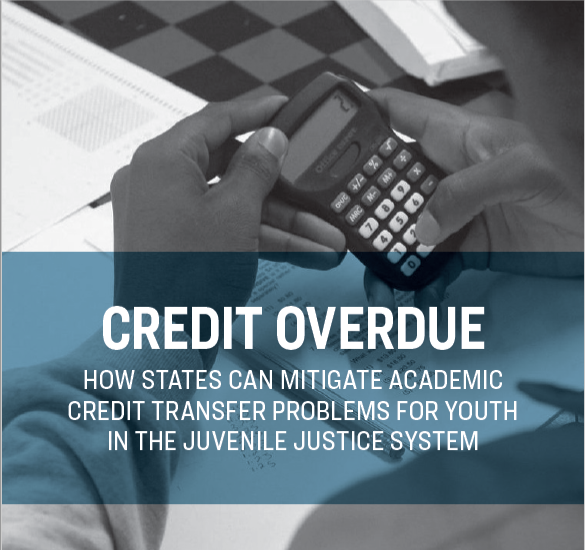
Philadelphia, PA (October 8, 2020): Juvenile Law Center, Southern Poverty Law Center, and Education Law Center-PA have released the report Credit Overdue: How States Can Mitigate Academic Credit Transfer Problems for Youth in the Juvenile Justice System. The report details the problems facing tens of thousands of youth on any given day in our country when it comes to their educational experiences in juvenile justice facilities. While these facilities provide classes to prevent young people from falling behind in their schoolwork, many discover that when they return to school they will not receive full academic credit for their completed coursework, that there is no record of their credits, or that their credits will not count toward graduation.
The lack of attention to ensuring that credits are awarded for coursework performed has serious educational and emotional consequences that put graduation and opportunity further out of reach.
Read our news release and the full report. Here is a fact sheet with highlights from the report.
ELC’s 2020 Back-to-School Guide for Pennsylvania Public School Students
The Education Law Center (ELC) has updated our “Back-to-School” guide for families, students, and schools. The information and fact sheets below now include COVID-related considerations for the upcoming school year.
School days during the pandemic may look very different. Students and families face unprecedented challenges. But they continue to have important education rights and protections under state and federal laws that ELC is committed to defending. Our students also remain deserving of equitable, affirming, and culturally responsive school spaces.
Black lives matter! As champions for education justice, we must grapple with the reality that for too many students and families, schools have been places of deep harm, glaring racism, and systemic oppression. Those inequities have grown more visible as schools struggle during the pandemic. At the same time, we are encouraged by increasing public attention to issues of race and disability, as many students are affected by intersectional systems of oppression.
As school resumes, ELC urges our partners, schools, and policymakers to prioritize equity and to confront the legacies of anti-Black racism and other systemic inequities in schools. Our focus is on underserved populations. Our mission is to ensure that all children in Pennsylvania have access to quality public education.
- Affirming & Safe Schools, Free from Racism
- Student Enrollment
- School Discipline
- Truancy
- Bullying & Harassment
- Students with Disabilities – IEP, 504 Plan
- Early Childhood Education
- Students Involved in Foster Care or Juvenile Justice Systems
- Students Experiencing Homelessness
- English Learners & Immigrant Students
- LGBTQ & Gender Nonconforming Students
1. AFFIRMING & SAFE SCHOOLS, FREE FROM RACISM
Back-to-School Basics
We know that schools often fail to provide equitable, safe, and affirming environments for all students, particularly students of color. Alarmingly, incidents of racial hate and abuse are on the rise. All schools in Pennsylvania should invest in anti-racist education, develop comprehensive equity policies and practices to enable students to thrive, and ensure that responses to incidents of hate address school climate as a whole. No school community is immune from the systemic and structural racism that pervades our country and culture. Educators and administrators have a legal obligation to speak out and to act to confront and prevent racial discrimination, including racist harassment in schools.
Schools are legally obligated to ensure that students are not being denied opportunities, treated differently, discriminated against, or harassed because of their race, color, national origin, or immigration status. Schools must have policies and practices to prevent and address unequal treatment like discrimination and harassment.
Need Help?
- The Right to Be Free from Racism at School
- Online and Hybrid Learning: An Equity Checklist for Schools
Say Their Names: Police brutality against Black people and other people of color is longstanding and continues to go unaddressed. But in the wake of horrific police killings of George Floyd, Breanna Taylor, and many others, a longstanding effort by students and community and civil rights groups to remove police from public schools has emerged as a path forward, with dozens of school districts severing ties with police or reducing police presence. More about this work is available from Dignity in Schools, the Advancement Project, and ACLU of Pennsylvania.
Impact of COVID-19: Black and Brown communities, hardest hit by the coronavirus, have also borne the brunt of school disruption, receiving diminished educational services. And students in underfunded school districts continue to be subjected to deplorable school building conditions, making those schools unsafe and ill-equipped to safely reopen. See ELC’s publication on toxic schools for related information.
The film “Pushout” encourages a robust response to the many ways in which a racist misunderstanding of Black girlhood leads to excessive punitive discipline and criminalization of students by schools. The film builds upon important research on the “adultification” of Black girls — a well-documented finding that Black girls are seen as less innocent and more adult-like than their white peers. This leads to Black girls being devalued, subjected to harsh, disparate treatment, and excluded from educational spaces legally charged with serving them.
Use the resources cited here and in our new fact sheet to engage with your child’s school and ensure that anti-racism, culturally responsive education, and full-school climate interventions are in place. Try to make sure that every member of the school community knows their rights and how to interrupt racism. Together, hold school leaders accountable for making this happen. Urge school and community leaders to invest in our schools, students, and communities, and disinvest from school police and punitive, exclusionary discipline.
2. STUDENT ENROLLMENT
Back-to-School Basics:
Students have the right to be enrolled in school within five days of submitting only four documents: proof of the child’s age, proof of where the child lives, immunization records, and a sworn statement of disciplinary record.
Due to potential delays in obtaining immunizations during COVID-19, the requirement to show proof of immunizations has been suspended for the first two months of the upcoming school year. Many districts are only accepting online enrollment, which requires internet access, taking pictures of enrollment documents, and uploading them online. Because it may be harder to get required documents during COVID-19 closures, families should ask the school to be flexible in what type of documents to accept and how families can send the documents to school.
Need Help?
- How to Enroll a Child in Public School
- How to Enroll a Child Living with Someone Other than Their Parent
- Enrollment Complaint Process
What’s New?
Starting this year, 2020-2021, the compulsory school age has changed, so children must be enrolled in and attending school when they are 6 years old and must attend school until age 18 (or until they graduate, whichever comes sooner).
Virtual learning at your home school or district: With many schools still operating via remote learning for some or all students, ELC has prepared a checklist as a guide to ensure that schools are serving all students equitably.
Considering a cyber charter school for your child? If you have questions about how cyber charters work, check out this recent webinar. Or visit Check Before You Choose: You will find information about teacher certification, performance ratings, supervision, and hours of instruction, and learn ways in which cyber charters differ from brick-and-mortar schools. For example, most cyber charters require a parent or guardian to serve as a learning coach for their child. For K-5, this means supervising the child’s schoolwork for an average of about five hours per day.
Cyber charter schools, like all charter schools, are public schools, required under the law to serve all students, including those with IEPs and English learners. But they may have limited experience doing so. To find out whether a cyber charter school has experience serving English learners, click here, search for the school by name, and click on the tab labeled “School Fast Facts.” To find out whether the cyber charter school serves children with your child’s type of disability, click here, scroll down to the name of the school, and click on the report for the most recent year.
3. SCHOOL DISCIPLINE
Back-to-School Basics:
Students have important rights and protections when facing exclusionary school discipline (e.g., suspension, expulsion, and disciplinary transfer). These include the right to proper notice, the right to ask questions, the right to an appropriate hearing, and in most cases, the right to receive education services in the interim and after exclusion.
Discipline will likely look different in the era of COVID-19. If your child is learning from home and the school is changing or limiting their online program, you may be entitled to rights and school discipline protections. If your child is sent home from school or told they cannot come back because they did not follow new safety and social distance rules, you still have the rights explained in the fact sheets below.
Need Help?
- Suspensions in Pennsylvania
- Expulsions in Pennsylvania
- Alternative Education for Disruptive Youth (AEDY)
- Alternative Education for Students with Disabilities
- Alternative Education for English Learners
- Student Rights to Free Speech and Expression
What’s New?
See our updated Student Rights to Free Speech and Expression fact sheet for new information and examples. Generally, a school only has the authority to restrict or punish students for speech that happens at school or a school-sponsored event or on the way to or from school. Some recent court decisions reinforced students’ rights to expression outside of school and on social media. What happens if your school is now all online with virtual classes and school-provided computer? These issues have not been directly addressed by the courts yet, but generally the same rules and standards apply to virtual classes and school activities.
4. TRUANCY
Back-to-School Basics:
Pennsylvania requires that all students go to school from age 6 until age 18 or graduation. This period is called “compulsory school age.” Legal consequences can arise when students have unexcused absences. If a student accrues three unexcused absences, they are considered “truant.” If a student has six or more unexcused absences, they are considered “habitually truant.” Schools must take steps to improve attendance for students who are habitually truant, including holding attendance improvement conferences to identify and address the reason for absences.
During COVID-19, schools are still legally required to take these steps to protect students’ rights and work with families to improve school attendance and participation. If these steps are taken and attendance does not improve, parents and students can face serious legal consequences, including fines and jail time. While ELC disagrees with these consequences, the law allows schools and decision-makers to impose them.
Need Help?
What’s New?
Changes to Pennsylvania’s compulsory school law go into effect this school year. COVID-19 has not changed this requirement. Schools are taking attendance and tracking participation, even if they are physically closed due to COVID-19. Check out your school’s website for information about how attendance will work during COVID-19 and whether changes have been made due to the pandemic.
The Pennsylvania Department of Education’s reopening guidance tells schools to consider equity and be flexible with attendance to help keep students and staff safe and to monitor for potential exposure.
5. BULLYING & HARASSMENT
Back-to-School Basics:
Bullying and harassment are serious issues that can significantly affect a child’s ability to learn. All students have the right to be free from bullying and harassment in school ‒ whether it is verbal, written, graphic, physical, or online. Pennsylvania schools are required by law to have written policies against bullying and harassment and must investigate and address complaints. Behavior may qualify as “harassment” if the offensive conduct relates to race, color, national origin/ethnicity, gender, gender identity, sexual orientation, age, disability, or religion. If your child is experiencing bullying or harassment, keep detailed records of each incident and request in writing that the school take action.
Attending a school “session” of virtual instruction while sitting at home during COVID-19 closures is still in-school time; school staff must intervene to interrupt and prevent any bullying or harassment, using developmentally appropriate interventions.
Need Help?
- What Can I Do If My Child is Bullied or Harassed? A Parent’s Guide to Advocacy in Pennsylvania Public Schools
- Cyberbullying
What’s New?
Though many schools are returning to virtual or online classes in fall 2020, students have the same rights to be free of bullying and harassment, and schools have the same obligation to promptly and effectively intervene to stop the offensive actions. For example, schools need to provide supervision and support in the online chat programs or other communications platforms they provide for accessing instruction, just as they should be supervising and intervening in bullying or harassment that may happen in the hallway or classroom at school. If a student experiences bullying or harassment in their virtual school model, follow the recommendations in our parent’s guide to collect information and report it to the school.
6. STUDENTS WITH DISABILITIES
Individualized Education Programs (IEPs)
Back-to-School Basics:
Students who have a disability that impacts their learning have the right to a “free appropriate public education” (commonly called a FAPE), a planned program of education and special services that takes account of a student’s individual needs. Special education and related services must be provided by the school free of charge. Parents have the right to participate in the special education process and consent to or refuse particular services. Students with disabilities cannot be punished for behavior that is caused by or related to their disability.
Students with disabilities and their parents still have all of these rights despite school closures and other changes related to COVID-19. Parents should be included in the creation of individualized plans for their students with disabilities to fully access remote learning, hybrid learning, or whatever plan a school develops in response to COVID-19. Students with disabilities should receive all necessary services, including related services, to address their needs.
Need Help?
- Guide for Parents and Advocates on the Right to Special Education in Pennsylvania
- Special Education Evaluations
What’s New?
As schools develop plans for reopening in response to COVID-19, students with disabilities should continue to receive the educational services that are required by their individualized plans or necessary for them to learn. If they do not, they are entitled to compensatory education. For example, if your child is required to receive weekly speech therapy, that service should still be provided weekly. Follow the recommendations in the Resolving Special Education Disagreements fact sheet if you disagree with your child’s plan developed by the school in response to COVID-19.
504 Plans
Back-to-School Basics:
If your child has a health condition, physical, mental, or behavioral impairment that “substantially limits” a “major life activity” and needs help to participate in or benefit from education or extracurricular programs, they may qualify for accommodations in school, called a “504 Plan.” Regardless of whether your child is attending school remotely or in-person due to COVID-19, your child’s 504 Plan should still provide accommodations and services that are necessary to access learning.
Need Help?
What’s New?
If you have questions or concerns about how your child’s 504 Plan is being used during remote or in-person learning, you should contact your school. Use ELC’s toolkit for strategies for requesting a 504 Plan, for guidance in getting a doctor’s letter of support, and for examples of the types of accommodations that can support students with varied health conditions.
7. EARLY CHILDHOOD EDUCATION
Back-to-School Basics
Children who receive quality early education do better in kindergarten and in school overall. Publicly funded programs such as Head Start, Early Head Start, and Pre-K Counts offer free early childcare and education programs for children from low-income families. The Early Intervention program provides additional services for children with developmental delays and disabilities at no cost to parents, regardless of income.
Need Help?
What’s New?
Young children with developmental delays and disabilities continue to have a right to early intervention services despite COVID-19 changes. Your child should still have an individualized plan that addresses developmental needs and provides educational services delivered in the appropriate manner so that your child can learn. This may be virtually, in your home, or in an early childhood education center. Learn more about whether your child is eligible for Early Intervention, how to request it, and how to design an appropriate plan by reviewing our Early Intervention FAQ (frequently asked questions).
8. STUDENTS INVOLVED IN FOSTER CARE OR JUVENILE JUSTICE SYSTEMS
Back-to-School Basics
Children involved in the foster care or juvenile justice systems have the right to a free public education, like all public school students.
Students in foster care have additional rights to ensure their school environment is stable, even if they change living arrangements. The right to “school stability” includes the right to remain in the same school even when youth change living placements, the right to enroll in a new school immediately without the required documents, and the right to have an active, involved education decisionmaker.
Students who are placed by court order in a residential facility – including students “adjudicated delinquent” – are entitled to attend the local public school in the district where the facility is located, unless certain exceptions apply.
Need Help?
- Rights of Students in Foster Care and the Juvenile Justice System
- Tips for Planning the High School Fall Semester for Youth in Foster Care
- School Stability & Immediate Enrollment of Students in Foster Care
- Toolkit for court-appointed “Educational Decision Makers” (EDMs)
What’s New?
Children and youth in the foster care and juvenile justice systems may need additional help during the COVID-19 crisis, particularly if they are in a residential placement. All youth have the right to a quality education and all the supports, equipment, and supplies needed to learn. Youth in residential facilities may need a change in placement or access to the local public school. Students with disabilities have the right to request IEP Team meetings to ensure they receive the supports and services needed to make meaningful progress and receive a free, appropriate public education. See our fact sheet for more.
Children in foster care continue to have a right to school stability and immediate enrollment, regardless of whether they are attending school in person or through remote learning. For more details, see Tips for Planning the High School Fall Semester for Youth in Foster Care.
ELC continues to advocate for the rights of students in residential placements through our class action lawsuit on behalf of students who were placed at Glen Mills Schools, where they suffered physical and emotional abuse and were deprived of their right to an education. In our case, Derrick v. Glen Mills Schools, the court upheld the right of students in the juvenile justice system to receive an appropriate and meaningful education, and ordered that the lawsuit can move forward on our claims that students were harmed by a systemic and wholesale failure to provide special education services and a legally compliant general education. The complaint contains graphic descriptions that may be hard to read; the litigation is currently in discovery stage.
9. STUDENTS EXPERIENCING HOMELESSNESS
Back-to-School Basics:
Students in all public schools, both district and charter, who are experiencing homelessness or housing instability, are entitled to school stability, and immediate enrollment in school, as well as free transportation to and from school. This includes unaccompanied students experiencing homelessness on their own. A federal law called the McKinney-Vento Act provides students experiencing homelessness a robust array of protections to ensure equal access to an education, from preschool through high school.
These protections do not have a time limit and remain in place until the student is no longer experiencing homelessness, even during COVID-19. McKinney-Vento eligible students have a right to school stability, with transportation provided until the end of the school year in which they secure permanent and adequate housing.
Need Help?
What’s New?
The McKinney-Vento Act remains in full force during the COVID-19 global pandemic.
Education Law Center helped secure and enforce an important victory for students who are experiencing homelessness on their own and have special education needs. These students do not have a way to assert their special education rights without the appointment of a surrogate parent. As a result of an ongoing complaint that ELC filed with Pennsylvania’s Bureau of Special Education, the state ordered the School District of Philadelphia to create a new system to ensure that surrogate parents are promptly appointed to students who are experiencing homelessness on their own. The district must now have a pool of at least 10 surrogate parents to meet the needs of unaccompanied students, which is a best practice used in other states. In addition to changes in Philadelphia, all PA districts have been reminded by the Pennsylvania Department of Education of their legal obligation to promptly appoint surrogate parents.
10. ENGLISH LEARNERS; STUDENTS & FAMILIES FROM LINGUISTICALLY AND CULTURALLY DIVERSE COMMUNITIES
Back-to-School Basics:
English learners have many special protections, including the right to learn English (with language instruction such as English as a Second Language or ESL), the right to supports, modifications, and accommodations in their core classes, and the right to be free from harassment based on their race, immigration status, or national origin. Parents whose first language is not English have the right to receive information about their child’s education in a language they understand.
All students have the right to attend school, regardless of their immigration status. Schools cannot ask about a student’s immigration status and cannot require a birth certificate or Social Security number before enrolling a child in school. Students and families from linguistically and culturally diverse communities should receive language services and accommodations that allow them to participate in education regardless of English proficiency.
For more information about the rights of immigrant, refugee, and asylee students and families, the U.S. Department of Education has a website with translated resources. Two factsheets are available in over ten languages on the rights of English learners to participate in educational programs and the rights of limited English proficient parents and caregivers to receive translation and interpretation for communications with school.
Need Help?
- Rights of English Learners & Limited English Proficient Parents
- Rights of Limited English Proficient Parents to Enroll Children in School
- Immigrant and Refugee Student Bill of Rights
What’s New?
Statewide school closures starting in March 2020 highlighted the ongoing challenges linguistically and culturally diverse communities experience with language access in education. As schools reopen in person, remotely, or a hybrid of both, protections for English learners, students, and families whose first language is not English, remain in force. English learners should receive language instruction to gain proficiency in reading, writing, speaking, and understanding English from certified ESL teachers. Subject teachers should provide accommodations, modifications, and support for English learners that are appropriate to each student’s age and English proficiency.
Students and families should also have information on educational programming, access to technology and meals, and health and safety protocols in languages they understand. Schools should provide interpretation and translation services to students and families whose first language is not English for general information. Schools must provide language access for parents and caregivers of students with disabilities so that parents may participate meaningfully and make educational decisions for their children.
11. LGBTQ & GENDER-NONCONFORMING STUDENTS
Back-to-School Basics:
LGBTQ and gender nonbinary or gender-nonconforming (GNC) students have the same rights as other students, including the right to be out and the right to be free from bullying and harassment. Schools must respect the right of transgender students to access facilities and programs aligned with their gender identity.
With COVID-19 school closures that require students to stay at home for virtual classes, there may be additional challenges for LGBTQ students resulting from limited access to community support, lack of in-school counseling and, in some cases, the difficult circumstances of quarantining with unsupportive family members. Schools have the obligation to support students’ social, emotional, and mental health, including via remote services and virtual meetings for a Gay Sexuality Alliance (GSA) or other student group.
If a student who is transgender, GNC, or nonbinary identifies a chosen name and pronouns, school staff should use that name and pronoun for all interactions, written and verbal, except where required by the law to use a child’s legal name. This includes providing an opportunity to correct the student’s name on any digital platforms a school is using during virtual learning (i.e. display name on Google Classroom). Purposefully and persistently misgendering a student may be harassment under the law.
Need Help?
What’s New?
The rights and protections of LGBTQ people have been clarified and affirmed at the highest level. In June 2020, the U.S. Supreme Court issued its decision in Bostock v. Clayton County, establishing that discrimination on the basis of sexual orientation and gender identity is inherently a form of illegal sex discrimination under Title VII. Courts have long analyzed Title IX about education discrimination in the same way as Title VII about employment discrimination, so this case is a powerful message for schools and LGBTQ and gender-nonconforming students too. Another appellate federal court, directly addressing the question of transgender students’ right to access bathroom facilities, held that “A public school may not punish its students for gender nonconformity. Neither may a public school harm transgender students by establishing arbitrary, separate rules for their restroom use.”
Finally, for everyone involved with public education in Pennsylvania, one of our back-to-school priorities must be to address the state’s inadequate and unfair funding of schools. Far too many children are returning to Pennsylvania schools that are lacking in resources and student supports.
Please participate in PA Schools Work, the statewide campaign for adequate and equitable funding and follow ELC on Facebook and Twitter for updates on our fair funding lawsuit against the state for failure to fund public education under the state constitution.
Please join us on September 24th as we celebrate 45 years of ensuring access to a quality public education for all children in Pennsylvania.
COVID-19 School Closures & Students with Disabilities
COVID-19 school closures have had a significant impact on students with disabilities and their families. ELC compiled this resource with 5 important things for students with disabilities and their families to know.
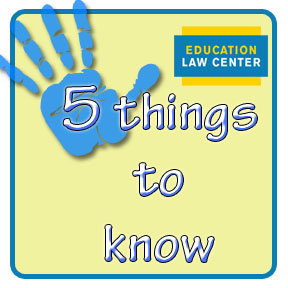
ELC Urges PA Officials to Instruct Schools On How To Ensure Equity During Closures
For immediate release: April 3, 2020
Following a March letter on concerns of educational equity signed by more than 80 organizations, a letter from the Education Law Center this week is urging Gov. Wolf and Secretary of Education Pedro Rivera to provide “clear, detailed guidance” to school districts on what steps they can take to ensure that all student populations are being supported in their education during COVID-19 school closures.
The latest letter highlights innovative strategies and promising practices that, if promoted by the Pennsylvania Department of Education, could help ensure equitable access to education for underserved student populations – including children with disabilities, English learners, children of color, children experiencing homelessness, children living in poverty, and children in the child welfare, juvenile justice and mental health systems.
“COVID-19 school closures present exceptional and daunting challenges for school administrators, teachers, staff, students and parents, as well as the Department,” the letter said, applauding state officials for their efforts to ensure continuity of education. “Your guidance at this time is essential to enabling our schools to meet these challenges as school districts, charter schools, and Intermediate Units work vigorously to meet the needs of their students.”
Detailed guidance from PDE is needed to “ensure … compliance with federal protections for vulnerable student populations, provide needed support to students and parents, and deliver individualized programming and a free appropriate public education for students with disabilities,” the letter says.
Legislation recently signed into law by Gov. Wolf, Act 13, instructs PDE to provide guidance to districts on what it means to ensure “continuity of education.” ELC’s letter asks PDE to encourage schools to provide planned instruction, rather than solely enrichment activities, and points to Pennsylvania districts that are doing so.
The letter also highlights specific strategies and recommended procedures for providing individualized planning for students with disabilities and equitable access for English learners and students experiencing homelessness, as well as ensuring continuity of education for system-involved youth in residential placements.
“We are hopeful that PDE will provide clear, detailed guidance to districts to help ensure our most underserved students can access education during COVID-19 school closures” says ELC’s legal director Maura McInerney.
ELC and 80 other Organizations Urge Gov. Wolf to Maintain Educational Equity During School Closures
In a letter to Gov. Tom Wolf and state Secretary of Education Pedro Rivera, the Education Law Center and more than 80 other community, parent, and child advocacy organizations across Pennsylvania called for an executive order and rigorous guidance to schools, requiring them to provide educational services to all children, including individualized programs to meet the needs of students with disabilities and appropriate supports for English learners.
In the letter (news release here), advocates express grave concern that children, particularly children with disabilities, English learners, and children living in poverty, will be “irrevocably harmed” if they do not receive adequate educational services while schools are closed due to COVID-19 for an extended period.
Your organization or firm can sign onto the letter here.
